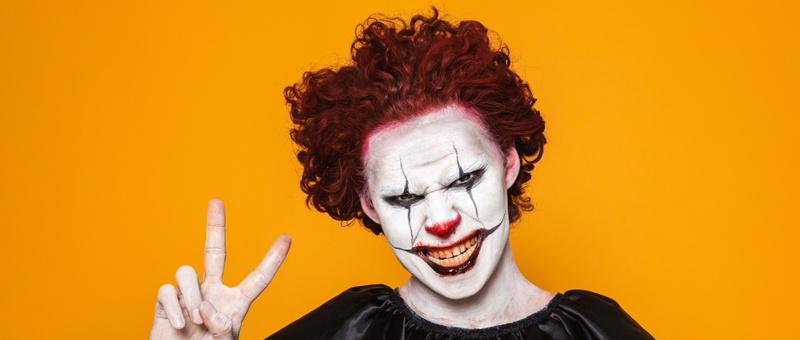
Why do we use dark humour as a coping mechanism?
Peer reviewed by Dr Colin Tidy, MRCGPLast updated by Victoria RawLast updated 12 Dec 2021
Meets Patient’s editorial guidelines
- DownloadDownload
- Share
- Language
- Discussion
A little dark humour never hurt anyone... or does it? Most of us have cracked a taboo joke to poke fun at unsettling situations. However, using dark humour as a way to laugh through the tough stuff is on the rise. But why do we do this? And does dark humour actually help or hinder us?
In this article:
What is dark humour?
Dark humour has many names, including gallows humour, dark comedy and morbid humour. It refers to a style of comedy that makes light of a topic that is considered to be off limits. These topics are usually quite serious, disturbing or painful to discuss. This type of humour is not for everybody - some may find it funny, but others can find it offensive.
Writers and filmmakers have been using dark comedy for decades, typically focusing on themes such as death, crime, poverty, war, violence, suicide, racism, misogyny, sexuality and other forms of discrimination.
However, dark humour now seems to have taken on a new life with the growth of the internet and social media, and the way it is used by young people. It's even used by brands as a form of marketing and a way of connecting with an audience. Nowadays, people use dark humour to poke fun at their own lives, whereas in the past, it may have been more targeted at others.
One famous example of dark comedy comes from Oscar Wilde on his deathbed: "Either that wallpaper goes or I do."
Why do we use dark humour as a coping mechanism?
Back to contentsClaire Brummell from The Universal Needs is an expert in human behaviour. She says, when we are in a position of coping, it's because one or more of our needs are being compromised in some way.
"It could be a period of intense grief, or overwhelming stress. We might have been through a trauma - the list goes on," she explains. "So the things that we use to try to cope are behaviours that we believe, consciously or subconsciously, will either stop those needs from being impacted, or will meet them in some way."
In the case of dark humour, there are a few needs that people tend to be subconsciously trying to meet when using it as a coping mechanism. Brummell explains what these are.
Emotional experience and expression
"The first need we are trying to meet with dark humour is our desire to experience and express the full spectrum of emotion," says Brummell. "At times when we are engaging in dark humour, it's often because we are having an overwhelming experience of the more 'negative' or challenging emotions, such as grief, sadness, and anxiety. When it feels like this is all we are experiencing, dark humour can be a way of trying to welcome in other emotions, such as amusement or some sort of cheer, so we are no longer only battling with the more challenging emotions."
She adds that dark humour is a way to not feel like you are drowning in difficult emotions, because there is something else being felt too.
Personal power
This need relates to our personal feeling of empowerment and our ability to create more of what we want in our lives. Brummell explains that when we feel the desire to engage in dark humour, we are in a situation where we might be feeling out of control or powerless.
"This can happen when we have lost someone we love, perhaps we are going through a break-up, or dealing with a serious medical diagnosis," she says. "Whatever it is, the situation is one where we don't feel in control. The use of dark humour can, if nothing else, offer a chance to choose how we respond to what is going on. It can make us feel a little more in control than we otherwise would have."
Love
The third and final need that we can be trying to meet with dark humour, is our need for love. This is the human need to connect with ourselves and others.
Often at times of great stress or trauma, we can feel very isolated and as though no one really understands what we are going through. While some people know exactly what to say to comfort someone during difficult times, it isn't always easy. When someone doesn't know how to deal with what a loved one is going through, it can cause them to pull back out of their own discomfort. In this instance, the person struggling might use dark humour to connect.
"Using dark humour to connect with others doesn't deny the darkness that is present in our situation," shares Brummell. "However, it can be an attempt to connect at a more surface level in a situation where we feel the opportunity or desire is not present to connect at a deeper level. In short, to stop us from feeling so alone."
Continue reading below
The negative impact of dark humour
Back to contentsBrummell explains that, while dark humour can provide us with some relief and connect us to others during challenging times, those things can come at a cost. While we are using dark humour to meet certain needs, it can have a negative impact on our needs too, which we don't necessarily realise.
"We are usually just focused on trying to minimise the impact of the tough situation on ourselves, so anything that offers us any kind of relief can seem like a good idea. But not everyone is comfortable with dark humour," she says.
"The reality is that sometimes dark humour can create a distance between ourselves and others, despite our attempts to connect. When we engage in dark humour, depending on how someone responds, it can make things awkward or drive away those we want support from the most."
When dark humour offends or upsets others, it can cause them great emotional stress. Perhaps this comes from a place of love, as they want to support you through difficult times but don't know how. Or, it could feel like a personal attack, especially if dark humour comments on something someone else struggles with or a part of their identity. We unintentionally might cause upset to others when using dark humour, because we are so caught up in our own problems. However, even if we are comfortable with the uncomfortable jokes, that doesn't mean everyone else will be.
"It can also keep us stuck in the dark patch of what we are going through, as that becomes the focus of every aspect of our behaviour, which can be overwhelming," Brummell says. "Dark humour can essentially become your personality."
As well as that, constantly using dark humour as a coping mechanism means it can become a mask for how we are feeling deep down. When we are putting on a front in this way, portraying to people that we are fine because we can crack jokes, we aren't actually addressing our problems. Suppressing our true feelings can only cause them to arise much more aggressively later on, perhaps when we suddenly find ourselves alone or dark humour is no longer an option. This can make them much more difficult to deal with if we've been putting it off.
Is dark humour good or bad?
Back to contentsBrummell admits that dark humour is neither good nor bad - it depends how it is used.
"Dark humour is a tool that can be used to great effect while navigating some of the difficult times in our lives. However, it can also set our healing back. As with most coping mechanisms in life, it's how you use it that makes the difference. For example, we might go out drinking following a relationship break-up, which there is nothing wrong with," she concludes.
"However, becoming reliant on alcohol for escapism and comfort is when a problem arises. Likewise, dark humour can be funny and uplift our spirits, but overdoing it to a point where we push people away and refuse to accept what we're going through, that can cause issues."
Patient picks for Mental wellbeing

Mental health
Why our brains are hooked on bad news
In a world where every global and local event is amplified by social media and 24-hour news cycles, switching off feels nearly impossible. Sensationalised headlines dominate our feeds, often leaving positive stories overlooked. This constant stream of information can become overwhelming - and even damaging - to our mental health. But why are we wired to focus more on bad news than good?
by Victoria Raw

Mental health
Helping your child cope with stress and worry over Christmas
Christmas is often described as “the most wonderful time of the year,” but for many families, it can also be one of the most stressful. Between disrupted routines, heightened expectations, and an overload of social events, it’s easy for children, parents, and families to feel overwhelmed. Mood swings, restlessness, or clinginess are common signs that a child’s routine or sense of balance has been knocked off course. Even small, thoughtful changes can make a real difference in helping children and young people feel a little more settled and supported over the Christmas period.
by Onebright Children and Young People (CYP) Clinical Team
Article history
The information on this page is peer reviewed by qualified clinicians.
Next review due: 23 Nov 2028
12 Dec 2021 | Latest version
12 Dec 2021 | Originally published
Authored by:
Emily Jane Bashforth

Ask, share, connect.
Browse discussions, ask questions, and share experiences across hundreds of health topics.

Feeling unwell?
Assess your symptoms online for free
Sign up to the Patient newsletter
Your weekly dose of clear, trustworthy health advice - written to help you feel informed, confident and in control.
By subscribing you accept our Privacy Policy. You can unsubscribe at any time. We never sell your data.